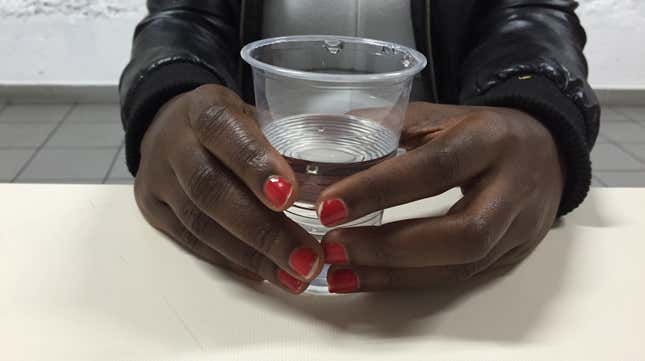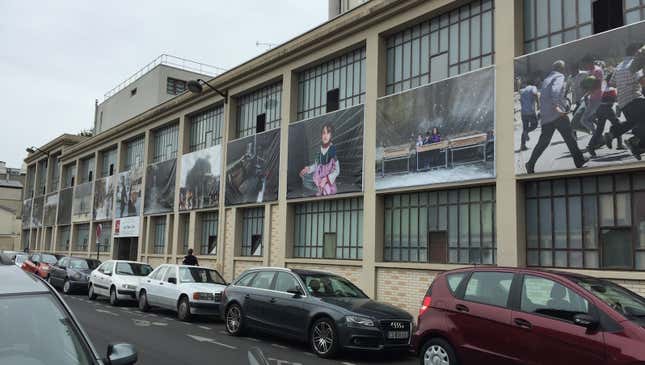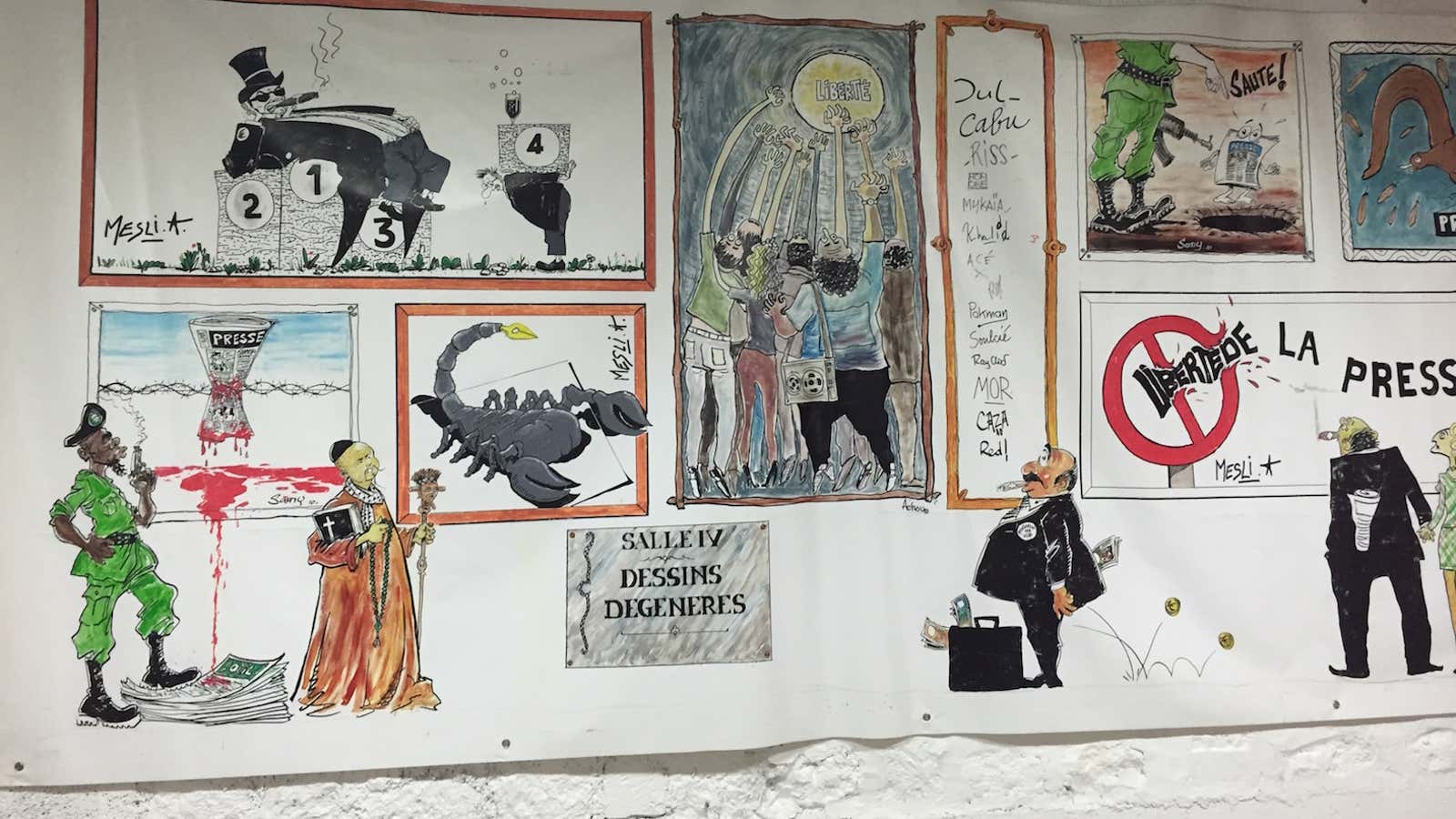“And because I make jokes sometime: and you know how dangerous it is to make jokes even in joke?”
—Ernest Hemingway, For Whom The Bell Tolls (1941)
PARIS, FRANCE—“I disapprove of what you say, but I will defend to the death your right to say it.” Voltaire never actually said (pdf) those words, but the great French writer would have understood how much they applied to the jokes made by the French satirical magazine, Charlie Hebdo.
Voltaire, exiled from Paris for almost three decades for his ironic anti-clerical works, would have also understood the potential repercussions—he himself made Islam one of his targets in his 1736 five-act play, Fanaticism, or Mahomet the Prophet. The deaths of the cartoonists at the hands of the Kouachi brothers earlier this year shattered some easy assumptions, perhaps the biggest being that we live in a world where you can’t be murdered over a joke.
Not far away from those bloodstained Charlie Hebdo hallways, on the other bank of the Seine, there’s a building that houses those who have experienced the alternative to death—exile. The men and women inside the Maison des Journalistes, the only refuge for threatened journalists in the world, already know how quickly a life can change over a few choice words.

None are famous. They committed small acts of courage and were punished for it. Truth is, few in the real world even care about all they have given up. When Quartz visited the Maison earlier this summer, a Syrian photojournalist, who asked not to be named, spoke of living through the siege of Homs with no food or electricity for a year. His brother was killed by a missile; the rest of his family is still there.
There was an Algerian, Mourad Hammam, whose eyes filled with tears as he talked about the corruption under president Abdelaziz Bouteflika. He was threatened after writing about a young man who was shot to death in the middle of a bar brawl, caused by a fight between the local mafia over which song to play. Behind Hammam hung a tableau of cartoons to celebrate Freedom of the Press Day; one showed an militiaman forcing an anthropomorphic newspaper to dig its own grave. Among the signatories was a longtime supporter of the Maison: Charlie Hebdo’s Cabu, once described by Jean-Luc Godard as “the best journalist in France.”
And there was a Rwandan, who was arrested after contradicting the official government line one too many times. She was taken to a “safe house”—illegal prisons around the country, where three men came to her in turn to make her remember a set script. She said:
Everyday someone comes and tells you what you will have to admit. They come day after day, to make you memorize what they want to you say during a press conference on TV. But I couldn’t. When they see that you can’t repeat it, they don’t organize the press conference. That’s how so many people are found dead.
After being held for a month, she was driven in a police car to a lake in the forest and tortured. She wouldn’t say what happened. Why didn’t they kill her? “I don’t know,” she replied. (Rwanda’s ambassador to the UK, Williams Nkurunziza, told Quartz: “The allegations are a figment of his/her imagination. Rwanda’s governance is rooted in the rule of law. Those who break the law in our country, including journalists, are tried by our courts.”) The Rwandan has escaped to France but she asked that she not be identified—her children are still back home.
A refuge in the 15th arrondissement
The Maison was the dream of a French journalist named Danièle Ohayon, after she was tempted into a conversation with a homeless person—who also turned out to have been a journalist, from Chechnya. “At home, they were heroes,” she later said (link in French). “But on arriving in Paris, they were nothing.”
After years of work, Ohayon and her friend, Philippe Spineau, launched the Maison des Journalistes in 2002. It makes do with a small staff on an annual budget of about €300,000, which comes mainly from media organizations like the Agence France-Presse as well as Paris’s city hall.
Successful applicants can stay for up to eight months; the Maison will help with applying for asylum and finding work. Last year, there were 60 applications for the 14 rooms. In the end, 31 journalists stayed in 2014, from 14 countries. More than 300 have stayed in 13 years. “There are a couple of countries from which we always have a couple of journalists,” said Darline Cothière, the current director of the Maison. “There are always Iranians.”
Exile has a long life in the history of literature—Solzhenitsyn, Nabokov, and Kundera were three of the 20th century’s most prominent exiles. Thucydides was banished from Athens in 424 BC for 20 years, and used the time to interview both the Spartans and Greeks and reconstruct the epic history of the Peloponnesian war, perhaps one of the earliest works of journalism.
“I think that all writers are drawn to the notion of exile,” Tim Finch told Quartz. He wrote an entire novel inspired by the Maison des Journalistes, based on his time working for the Refugee Council of Britain. Finch chose never to visit the Maison, reimagining it in his book as an elegant townhouse in London with state-of-the-art facilities. He said he didn’t want to cloud his mental image with reality. “That said, of course, I assume (or at least, hope) it is a wonderful place and wish it well,” Finch said.
In reality, the Maison, a converted factory opposite a cemetery, is a grim place. The accommodation is basic at best. The background noise is of an old washing machine and people struggling to learn French using ancient computers. Cockroaches roam the floor. As if to remind the residents that they could be even worse off, the main entrance is named after Anna Politkovskaya, the crusading Russian journalist who was killed in Moscow in 2006.
Hammam, the Algerian journalist, has already left put his family in a hotel 20km (12.5 miles) outside Paris. “The conditions are miserable,” he said. “I come here every day to work and create activities for myself in order to not fall into stagnation or depression during the wait to be granted asylum, but it is very difficult.”
Keeping journalists, and their dim hopes, alive

Perhaps the enduring appeal of exile is the hope of being proved right—of returning like Voltaire in triumph to a welcoming, rapturous Paris after 28 years on the run. “Exile is a dream of a glorious return. Exile is a vision of revolution: Elba, not St Helena. It is an endless paradox: looking forward by always looking back.” Salman Rushdie wrote those words in The Satanic Verses, a novel that saw him marked for death by Ayatollah Khomeini in 1989 and sent to hiding for a decade. Two of his translators survived assassination attempts; Hitoshi Igarashi, the Japanese translator, did not.
Yet so very few in exile get to experience their glorious return. Cothière remembered fondly an elegant 50-year-old lady from Iraq, “a great intellectual who had been president of a literary club and a journalist and a writer.” She had lived in a large villa in Baghdad but it was destroyed during the US invasion of Iraq and its subsequent descent in lawlessness under the occupation.
The lady fled to Paris. “When one finds themselves completely alone having lost everything—social, material, economic—and they are in a little room in the 15th arrondissement in Paris, it is very humbling,” Cothière said. “Often she would often come crying and I would have to try and find words of comfort.”
The Maison is a sanctuary in an age when there is censorship not only from dictators and tyrants but also individuals like the Kouachis. Reporters Without Borders says that 71 journalists were killed last year. So far this year, 144 have been imprisoned and 41 have died. “More journalists are being killed, exiled and imprisoned and in this sense, the Maison is a sort of barometer of the situation of liberty of the press in the world,” Cothière says.

Outside, the building was plastered with huge portraits that showed life inside the Syrian civil war—the work of a former resident of the Maison. A boy kicking a soccer ball down the street paused and looked up at the photos. For a moment, perhaps, he was away from the safe streets of Paris, in another terrain where other children played, too—all the while coping with explosions, snipers, bombs falling from the sky, death. A disconnect that the men and women inside feel on a daily basis.
The sky was pregnant with rain, ready to come flooding down any minute. The boy paused, and then carried on playing with his ball. The moment passed.
